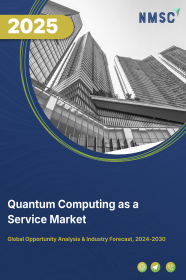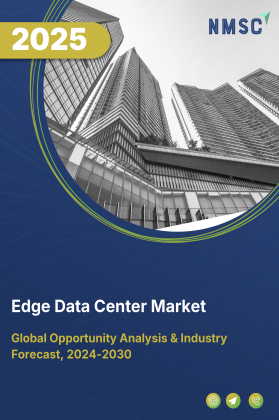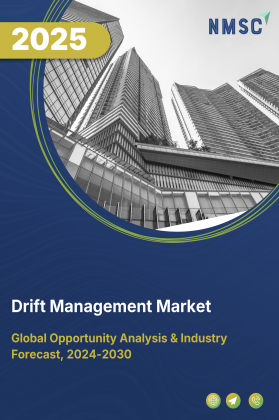
Quantum Computing as a Service (QCaaS) Market by Enterprise Size (Small and Medium Enterprises and Large Enterprises), by Application (Data Optimization and Analysis, Design Verification, Object Recognition, Pattern Recognition, Simulation, and Others), and by Industry Verticals - Global Opportunity Analysis and Industry Forecast 2021-2030
Market Definition:
The Quantum Computing as a Service (QCaaS) Market size was valued at USD XX million in 2020 and is predicted to reach USD XX million by 2030 with a CAGR of XX% from 2021-2030.
Conventional computers operate on binary bits that can either be1 or0. Whereas, quantum computers use Quantum bits (Qubits), which can achieve a mixed state, known as “superposition” where they are both 0 and 1 at the same time. Due to this, Quantum computers can store, process andtransfer vast amount of information in a quick span of time. Quantum Computing as a service (QCaaS) is a cloud-based service that provides access to quantum computing platforms whenever required.
Key benefits of QCaaS includes reduce operational and administrative resources & costs, eliminate unplanned capital spend & forklift upgrades, reduce downtime, and achieve better performance among others. QCaaS is also extensively used to develop artificial intelligence (AI) functionality, that requires huge computational capabilities.
Market Dynamics and Trends:
Increasing adoption of Software as a service (SaaS) business model and growing need for high-performance computing among major tech companies across the globe are factors expected to drive the QCaaS market growth during the forecast period. In addition, rise in cloud adoption and growing demand for data centers due to burgeoning data workloads across industry verticals are also other factors expected to propel the QCaaS market growth.
Moreover, increased investments in quantum research and developments, coupled with adoption of collaboration strategies among major market players for the development of quantum computing platforms are some of the key factors expected to boost the market growth.
However, the QCaaS market faces challenges such as high cost of installation which in turn could restrain the market growth to a certain extent. As quantum computers are developed with high-tech devices and complex software environments, the need for technical assistance increases significantly. Thus, lack of skilled workforce could also hinder the market growth during the forecast period.
On the contrary, growing adoption of quantum computing technology in healthcare industry and investments in quantum computing technology by the emerging countries are opportunistic factors that could advent the growth of the market in the coming years.
Market Segmentations and Scope of the Study:
The Quantum Computing as a Service market is segmented on the basis of application, industry vertical, and geography. On the basis of enterprise size, the market is classified into small and medium enterprises and large enterprises. On the basis of application, the market is categorized data optimization and analysis, design verification, object recognition, pattern recognition, simulation, and others. On the basis of industry vertical, the market is categorized into healthcare and life sciences, energy and utilities, banking, financial services and insurance, IT and telecommunication, retail and ecommerce, transportation and logistics, government, and others. Geographic breakdown and analysis of each of the aforesaid segments includes regions comprising of North America, Europe, Asia-Pacific, and RoW.
Geographical Analysis:
Asia-Pacific QCaaS market will witness significantgrowth in terms of CAGR in the coming years due to increasing government initiatives in the countries such as Japan, China, and India. For example, in Japan, the Quantum Technology Innovation Strategy established in 2020 has allocated approximately USD 470 million to help build the roadmap for technological and integrated innovation areas in the field of biotechnology and AI, which in turn increased the demand of QCaaS.
On the other hand, North America QCaaS market holds the highest revenue share in 2020. This is attributed to favorable government policies and initiatives in this region. Also, top players such as IBM, Google, and Honeywell, and startups, such as Rigetti and IonQ are focusing on developing machines that are expected to solve real-time intractable problems with increasing applications spanning across chemical modeling, hedge fund portfolio-strategizing, drug discovery, and A.I. advancements.
Furthermore, Europe QCaaS market is expected to show a steady growth as the countries in the region are witnessing high demand for quantum computing applications. For instance, on July, 2021, Oxford Quantum Circuits (OQC) launched UK’s first commercially accessible Quantum Computing-as-a-Service built entirely using its proprietary technology. This signified a milestone in unlocking the potential of quantum computing in Europe.
Competitive Landscape:
The QCaaS market is comprised of various market players such as IBM, D-Wave Quantum Inc., Microsoft, Amazon Web Services, Rigetti Computing, Google, Intel, Toshiba, Quantinuum, and QC Ware. Some of the other key players includes Honeywell International Inc., AvanetixIonQ, Quantum Circuits, Inc., Toshiba Corporation, Accenture PLC, and others. Some of the players are launching and adopting key development strategies to garner high consumer base.
For instance, on 8 July 2021, Oxford Quantum Circuits (OQC) launched Quantum Computing-as-a-Service for businesses exploring the commercial and technical benefits of quantum computing. In addition, the OQC’s proprietary technology is available to the enterprise via its private cloud, which in turn provides additional security to the enterprises.
Key Benefits:
-
The QCaaS market report provides the quantitative analysis of the current market and estimations through 2021-2030 that assists in identifying the prevailing market opportunities to capitalize on.
-
The study comprises a deep dive analysis of the QCaaS market trend including the current and future trends for depicting the prevalent investment pockets in the market.
-
The information related to key drivers, restraints and opportunities and their impact on the QCaaS market is provided in the report.
-
The competitive analysis of the market players along with their market share in the QCaaS market.
-
The SWOT analysis and Porters Five Forces model is elaborated in the study.
-
Value chain analysis in the market study provides a clear picture of the stakeholders’ roles.
Key Market Segments:
By Enterprise Size
-
Small and Medium Enterprises
-
Large Enterprises
By Application
-
Data Optimization and Analysis
-
Design Verification
-
Object Recognition
-
Pattern Recognition
-
Simulation
-
Others
By Industry Verticals
-
Healthcare and Life Sciences
-
Banking, Financial Services and Insurance
-
IT and Telecommunication
-
Retail and eCommerce
-
Energy and Utilities
-
Transportation and Logistics
-
Government
-
Others
By Geography
-
North America
-
U.S
-
Canada
-
Mexico
-
-
Europe
-
UK
-
Germany
-
France
-
Spain
-
Italy
-
Netherlands
-
Denmark
-
Finland
-
Norway
-
Sweden
-
Russia
-
Rest of Europe
-
-
Asia-Pacific
-
China
-
Japan
-
India
-
Australia
-
South Korea
-
Thailand
-
Singapore
-
Rest of Asia-Pacific
-
-
RoW
-
Latin America
-
Middle East
-
Africa
-
Key Players:
-
IBM
-
D-Wave Quantum Inc.
-
Microsoft
-
Amazon Web Services
-
Rigetti Computing
-
Google
-
Intel
-
Toshiba
-
Quantinuum
-
QC Ware
REPORT SCOPE AND SEGMENTATION:
|
Parameters |
Details |
|
Analysis Period |
2020–2030 |
|
Base Year Considered |
2020 |
|
Forecast Period |
2021–2030 |
|
Market Size Estimation |
Million (USD) |
|
Market Segmentation |
By Enterprise Size (Small and Medium Enterprises and Large Enterprises), by Application (Data Optimization and Analysis, Design Verification, Object Recognition, Pattern Recognition, Simulation, and Others), by Industry Vertical(Healthcare and Life Sciences, Energy and Utilities, Banking, Financial Services and Insurance, IT and Telecommunication, Retail and E-commerce, Transportation and Logistics, Government, and Others) |
|
Geographical Segmentation |
North America (U.S., Canada, Mexico) Europe (UK, Germany, France, Spain, Italy, Netherlands, Denmark, Finland, Norway, Sweden, Russia, Rest of Europe), Asia-Pacific (China, Japan, India, Australia, South Korea, Thailand, Singapore, Rest of Asia-Pacific ) Rest of World (Latin America, Middle East, Africa) |
|
Companies Profiled |
IBM, D-Wave Quantum Inc., Microsoft, Amazon Web Services, Rigetti Computing, Google, Intel, Toshiba, Quantinuum, and QC Ware. |

















 Speak to Our Analyst
Speak to Our Analyst

























